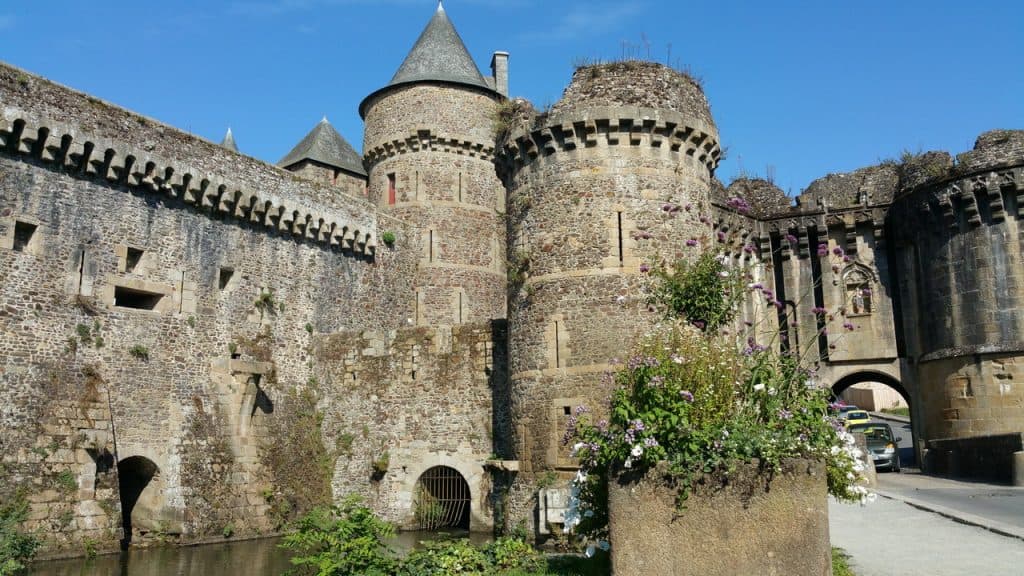
We had a big problem!
They speak French in France.
Doh! Didn’t you know?
Yes I did.
And that shouldn’t have been a problem…
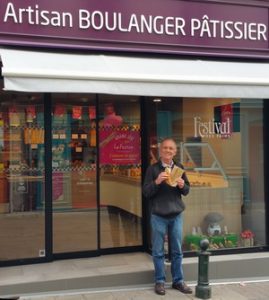
Because we’d brushed up on our tourist French.
So I could ask for a croissant, a baguette, a crêpe…
What more should we need?
Technical French, maybe?
It turned out that’s exactly what we did need.
You see…
We’d rented a small gîte.
Le Petit Bleu was right out in the French countryside. It was pretty, very French, with a laid-back and relaxing atmosphere.
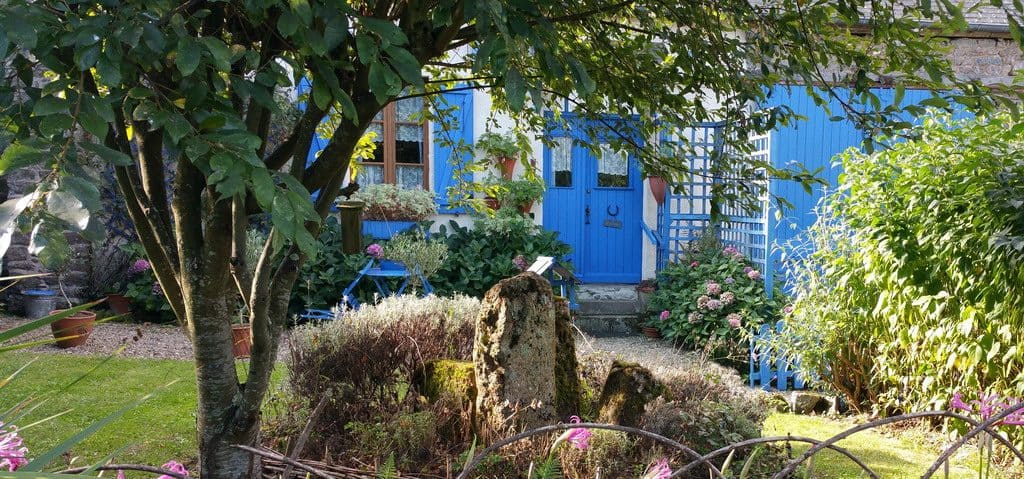
And the log burner, with a plentiful supply of wood, made the cooler October evenings very comfortable.
The TV programmes were French. But it was good to get away from television for a while.
There was a nice welcome pack with croissants, wine, and lots of other goodies…
And we were free to pick lots of delicious home-grown fruit and vegetables.
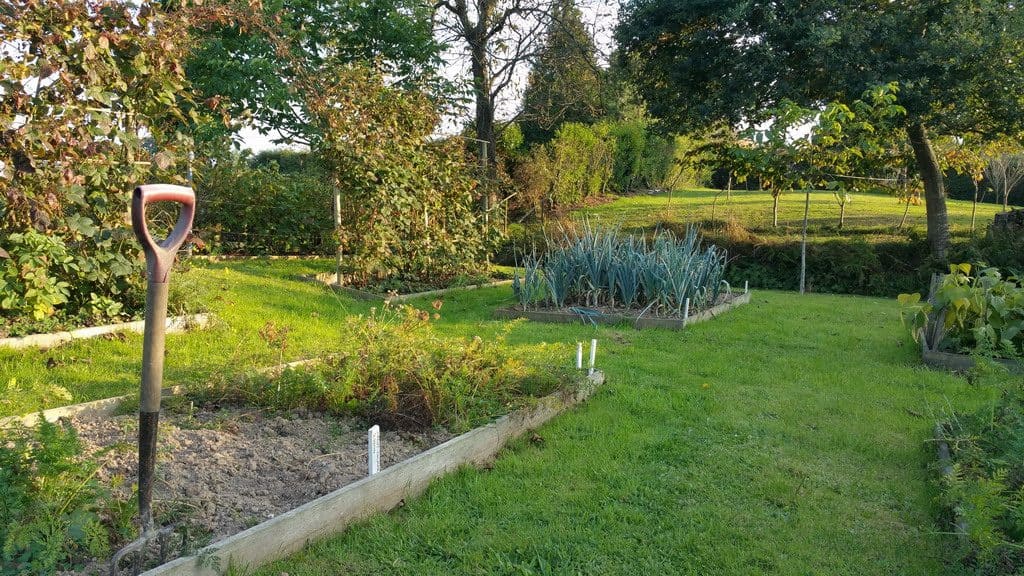
Nice.
What more could one want?
Actually, there was just one thing…
We Need WiFi
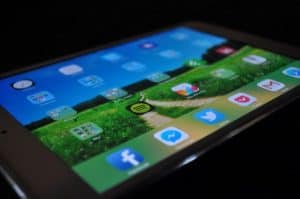
WiFi.
What? No WiFi?
Actually, there was WiFi… if we stood outside the owners’ house at the other side of the courtyard.
But there was no signal at all in our cosy little gîte.
“We can’t let it spoil the holiday,” said Christine, sensing my disappointment.
“After all, everything else is wonderful.”
So we worked out a solution:
Each morning, before we drove off to explore, we’d stand near the house to get some signal.
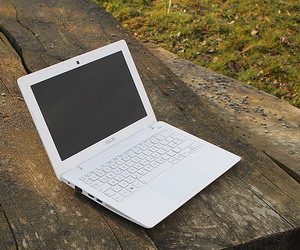
“Should we visit a chateau today?”
“Hang on, I’m watching this live video on Facebook!”
And again in the cool of the evening…
“I know it’s cold, but I need to send just one more email…”
It wasn’t ideal. But the price of roaming data on our own network was too expensive to consider.
Suddenly it dawned on me…
“I wonder how much a French SIM card costs?”
Ou Est Le Phone Shop?
It’s a nice, crispy, sunny, October Monday morning in this small town in Northern France.
Thankfully, the lady in the tourist information office can speak enough English to point us in the direction of the mobile phone shop.
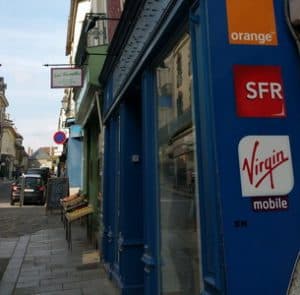
So off we trot down The Rue, to the phone shop.
“I hope they speak English,” I say to Christine as we peer through the window.
“Of course they will,” she assures me.
“They’re all young people. They’ll have learned English at school”
So in we go. And wait in the short queue.
“Hey, it’s our turn now, Luv,” whispers Christine, jabbing me in the ribs.
“OK. I’m ready…”
“Parlez-vous Anglais?” I ask the young lady behind the desk.
“Non,” she replies.
Well, I understand that OK.
“Does anyone else here speak English?” I ask, in English, but with an Allo Allo sort of accent, so that she can understand.
“Non.”
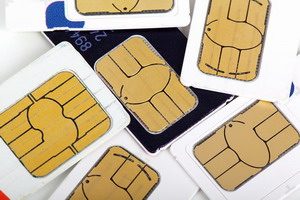
OK…
Deep breath…
“Je voudrais une SIM carte…” I say slowly, thoughtfully considering each word.
“Avec une GigaByte de data”.
“Hmm,” I think to myself. “Not bad. She’ll understand that.”
Understand or not, I certainly can’t understand her reply.
“Google Translate, why won’t you work when I need you?”
Once more, I turn to face the flustered girl.
“Une GigaByte data,” I repeat in my best French accent, remembering to add “s’il vous plait” for good measure.
Surely that’s universal language… everyone must know what a GigaByte is.

But the look on the girl’s face tells me that my theory is completely off the mark.
So out come the paper and pen.
And eventually we both understand that I’ll buy a SIM card for 10 Euros, and will load it up with 1GB of data for another 10 Euros.
- Passport handed over for ID
- SIM card changed in phone
- Pre-paid data loaded onto SIM
- Twenty Euros handed over
…and I’m good to go.
So now I turn around, and a dozen pairs of French eyes glare down on me as I squeeze past towards the exit.
Oh dear…
How on earth did that long queue build up…?
Time For Some Research
With my new data package, I could find out why the shop assistant hadn’t understood what I meant by a GigaByte.
In French, it’s known as a Giga Octet.
They write it as Go, instead of GB.
Makes sense, I suppose.
An Octet is the 8 bits that makes up the Byte.
So strictly speaking, I suppose, the French word is more literal.
No wonder she couldn’t understand me.
More Data Please…
When we needed another GigaByte (oops, I mean GigaOctet) top-up, we decided it would be better to go to a different branch in another town… many miles away!
This time I was much more prepared.
“Parlez-vous Anglais?”
“Non!”
“Je voudrais une GigaOctet data s’il vous plait.”
“Oui.”
In and out in 5 minutes.
It’s amazing what a bit of knowledge and preparation can do.
I learned an important lesson, too…

If I’m going to be a good communicator, I’ve gotta speak the other person’s language.
So if they use a different word to describe something…
Use that word instead.
If a cup of tea is a “cup of cha”, a “mash”, a “brew”, or a “cuppa”… that’s what it is.
If they call a bread roll a “barm cake” or a “bap”, that’s what it is.
If they call brussels sprouts, “nobby-greens”, that’s what they are.
If they’re technical, talk technical.
If they’re non-technical, maybe use analogies.
Using the other person’s language is the first step to being understood, accepted, and appreciated.
Facebook is Speaking my Language
This month, the Content Marketing Academy is running a Facebook Live Video challenge.

The idea is to “go live” on camera every day.
Now I joke that I don’t even have a face for radio, never mind video!
But I decided to join in.
That’s one of the reasons I needed the data in France.
John Espirian is a technical writer who’s also taking part in the challenge.
I really like John’s videos, because he simplifies technical stuff into everyday language.
Here’s one of them: How to create Twitter Lists and Twitter Video.
I hadn’t realised Twitter video would be that simple.
So I got my mobile phone, made a personal video, and tweeted it to him.
John replied with his own video.
Cool, eh?
Try it out.
John speaks the language of his audience.
And because of that, I learned how to do something I’d never done before.
Yes… French GigaOctets and Facebook Live have taught me a lot about communicating.
Now… did someone mention a bacon barm cake…?

What sort of communication problems have you had?
And how did you get round them?
Do let me know in the comments box below…


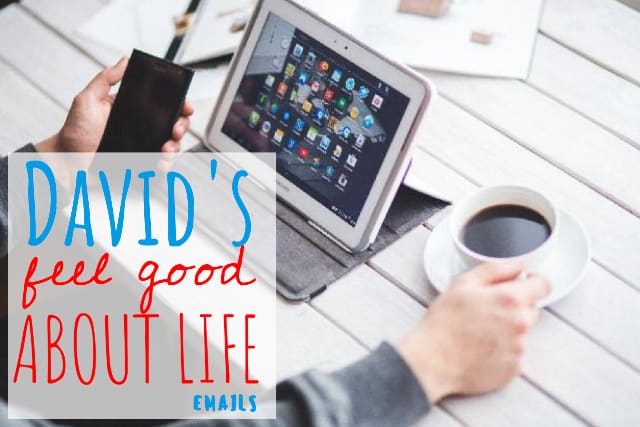

Leave a Reply